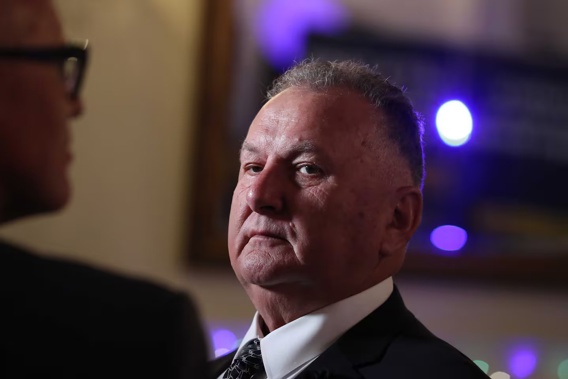
Attorney-General Judith Collins is planning to speak with senior minister Shane Jones - again - after he took another crack at the judiciary while defending his previous “communist” comment.
The New Zealand Bar Association on Wednesday raised concerns about “attacks on our judiciary” after several comments from ministers, including Jones who in a May meeting called a judge a “communist”.
While being questioned by media on that matter today, Jones took another swipe at the judiciary.
Asked what the context was for calling a High Court judge a “communist”, he said: “This was a broad discussion that the creep of a lot of these judicial decisions is beginning to show elements of totalitarianism and I don’t like it.”
Just moments later, Collins passed by the media pack and was alerted to his latest remark.
“I haven’t heard him say that,” she said. “I will speak to him.”
She said she had sent a letter to ministers earlier this year reminding them of the need to respect the role of the judiciary and had also subsequently spoken to Jones about earlier comments he had made.
“It is always better to keep the respect between the executive and the judiciary as it is between the Parliament and the judiciary. I will be speaking to him further.”
NZ First's Shane Jones on election night. Photo / Michael Cunningham
Jones earlier said he understood the “important role” the Bar Association plays.
“I wouldn’t take out of context one loose, humourous remark in a private meeting that I didn’t know was going to be leaked,” Jones said.
The notes were released as part of a Waitangi Tribunal inquiry. Officials recorded comments from ministers, including Jones, during a discussion with seafood industry representatives about government plans to make it more difficult for Māori to gain customary marine titles to foreshore and seabed.
“I want those officials to be a bit more judicious in how they record the discussions,” Jones said today, believing it made the meeting sound as if it had a secretive agenda.
“I don’t want to talk about the judge for fear of offending her sensibilities anymore.”
The Bar Association on Wednesday said it had written to Collins to “seek actions” over ministers’ comments, which it argued “go much further than criticisms or discussions of judgements”.
When the Herald subsequently asked Collins whether she would take action, she said she had spoken to her colleagues about their obligations as ministers earlier this year and “I have no plans to remind them again at this stage”.

Attorney-General Judith Collins. Photo / Mark Mitchell.
Prime Minister Christopher Luxon on Tuesday said Jones’ “communist” comment was “descriptive, not critical” and he was “perfectly free” to make it.
The judge in question, High Court Justice Cheryl Gwyn, was reportedly a member of a Socialist Action League group when she was a young law graduate.
Labour leader Chris Hipkins said Jones’ comment undermined the independence of the courts.
“For Christopher Luxon to then fail to call his Minister out on it and instead dismiss calling a judge a ‘communist’ as just being descriptive is a failure of his duty as Prime Minister and to uphold an important part of our legislature. It is also a failure of leadership.”
The association’s statement said the judiciary “can be an easy target” as judges can’t speak in defence of themselves or their judgments.
“The careful separation and balance of powers between our courts, government and politicians means ministers must not engage in any personal criticism of judges or the leadership of the courts. Just as the courts and judges remain outside of politics.
“In recent years, we’ve seen polarising criticism of the judiciary in other countries. The risks of politicisation of the judiciary are clear. We do not want to follow other examples overseas where there has been a loss of independence in the courts.”
The decisions of judges should be open to challenge and debate, the association said. But the way politicians and other leaders talk about the judiciary “is important”, the statement said.
“It is fundamental for our democracy that judges are not the subject of personal attack or criticism by ministers that may risk judges being restricted in their role. Judges must be capable of being able to freely play their independent constitutional role in Aotearoa New Zealand.”
The association believed this was an occasion in which the legal profession needed to speak up and urged the Government to ensure ministerial conduct “is not condoned by inaction”.
The Cabinet manual states that ministers “should not express any views that are likely to be publicised if they could be regarded as reflecting adversely on the impartiality, personal views, or ability of any judge”.
Jamie Ensor is a political reporter in the NZ Herald Press Gallery team based at Parliament. He was previously a TV reporter and digital producer in the Newshub Press Gallery office.
Take your Radio, Podcasts and Music with you









